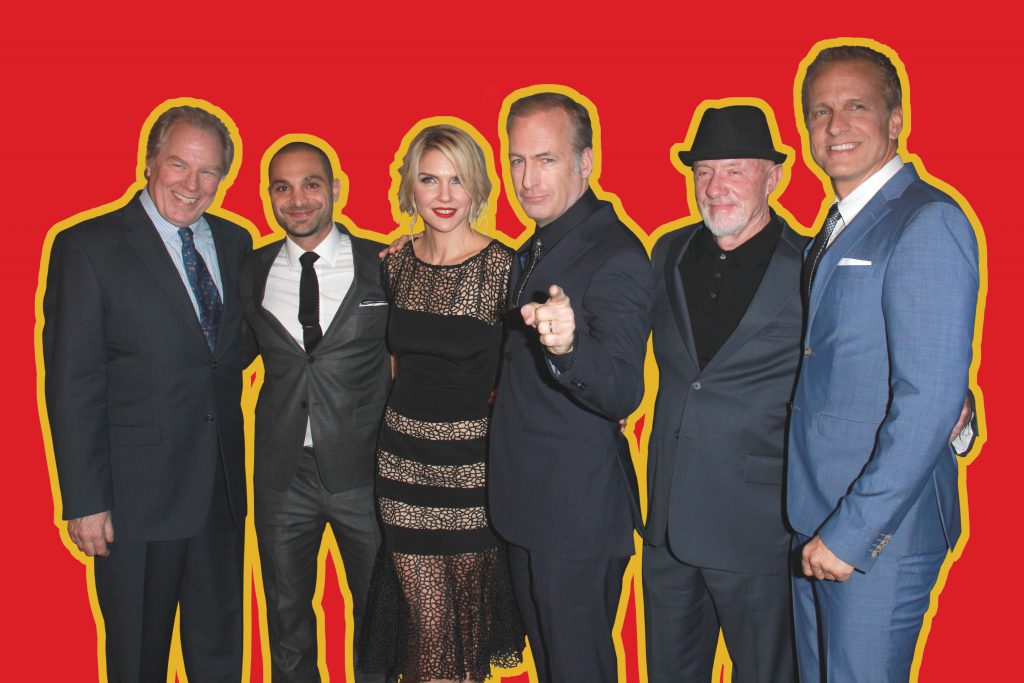Better Not Call Saul: South Florida Litigators Discuss the Accuracy—or Lack Thereof—of AMC's Hit Show
With the fourth season of AMC's "Better Call Saul" barreling toward its climactic conclusion, the Daily Business Review spoke with South Florida attorneys to discuss what the show gets right about practicing law, what it gets wrong, and whether or not Jimmy McGill would last a moment in front of a judge.
September 17, 2018 at 12:56 PM
8 minute read
 Michael McKean, Michael Mando, Rhea Seehorn, Bob Odenkirk, Jonathan Banks and Patrick Fabian at the “Better Call Saul” series premiere at Regal Theater on Jan. 29, 2015, in Los Angeles. Photo: Roberto Jimenez
Michael McKean, Michael Mando, Rhea Seehorn, Bob Odenkirk, Jonathan Banks and Patrick Fabian at the “Better Call Saul” series premiere at Regal Theater on Jan. 29, 2015, in Los Angeles. Photo: Roberto Jimenez
The televised legal drama is almost as old as the medium itself. From the time of “Perry Mason” in the 1950s through the height of “L.A. Law” in the 1980s and 1990s, and continuing all the way to the “Suits” of today, American audiences have nursed a well-documented and lengthy love affair with fictional litigators. It helps that viewers have had a deep bench to throw their lot in with: Whether they're of the over-the-top Denny Crane variety or cut from the same confident cloth as Alicia Florrick, audiences have had no shortage of compelling, noble and well-rounded practitioners of the law to become attached to.
And then there's Saul Goodman.
First introduced as much-needed comic relief on AMC's dour hit show “Breaking Bad,” Goodman, portrayed by once-cult comedian Bob Odenkirk, is better known for his antics outside of the courtroom than within. Operating as a solo practitioner from an office located in a New Mexico strip mall, Goodman is depicted as a huckster, pumping out obnoxious, Americana-draped advertising (“Better Call Saul!”) to attract down-on-their-luck clients, and using his legal education from the fictional University of American Samoa to launder money for meth-manufacturer and eventual drug kingpin, Walter White.
As one character notes while explaining why anyone would seek Goodman's services: “When the going gets tough, you don't want a criminal lawyer. You want a criminal lawyer.”
Even though Goodman is far from anyone's idea of an idealized attorney, he proved a compelling enough character for AMC to deem him worthy of his own spinoff and prequel, the appropriately named “Better Call Saul,” in 2015.
Far removed from the wanton violence and drug-addled dealings of “Breaking Bad,” thus far “Better Call Saul” has played out in a manner befitting of a Greek tragedy. Rather than checking in with the morally compromised and willfully criminal conduct of Goodman on a week-to-week basis, viewers have instead familiarized themselves with Jimmy McGill, a cash-strapped public defender and eventual elder law practitioner who has yet to adopt the humorous pseudonym or felonious behavior glimpsed in “Breaking Bad.”
Now in its fourth season, “Better Call Saul” has continually defied expectations. Despite being initially anticipated by audiences to be a misadventure-filled romp, “Better Call Saul” has instead revealed itself as one of the most heartbreaking shows on television, with Jimmy's transformation into Saul proving to be unexpectedly tragic, as opposed to comedic.
Perhaps what's most surprising is that several attorneys have referred to “Better Call Saul” as one of the most accurate depictions of the legal profession ever broadcasted.
Although every one of them alternately described the main character's actions as “unethical” or some deviation thereof, the Daily Business Review spoke to three prominent South Florida attorneys who attested that when it comes to the small things—namely, the day-in and day-out routine of being a practicing litigator—the show succeeds in its portrayal of the legal community where other programs have failed.
 Joshua T. Higgins.
Joshua T. Higgins.Courtesy photo
“I can't really think of another show or movie I've seen that has depicted as it accurately as 'Better Call Saul' in regards to kind of the monotonous, daily life of many attorneys who are reviewing documents until the end of time,” said Kelley Kronenberg partner Joshua T. Higgins, who added that the show “does a really good job of showing the less glamorous parts of being an attorney.”
Higgins, who worked as a prosecutor prior to joining Kelley Kronenberg's Fort Lauderdale office, says the show excels at representing the respective struggles of solo practitioners—as shown via Jimmy's ongoing challenge to attract clients—versus those of large firms as glimpsed through the employees of the Hamlin, Hamlin & McGill (HHM) law firm. This includes Jimmy's love interest, Kim Wexler, as well as his brother-turned-tormenter rival Charles “Chuck” McGill and name partner Howard Hamlin.
“Jimmy's making deals in the bathroom, his office is in the back of a nail salon; obviously it's very heightened for comedic effect, but what I find interesting about it is that it's the reality, in a broader sense, of a lot of solo practitioners in that they have to hustle continually to get clients,” Higgins said. Higgins cited an instance early on in the show when prospective clients, the Kettlemans, opt to go with HHM as counsel over Jimmy.
“They didn't want to go with this no-name, little-guy attorney,” Higgins noted. “I think that's interesting because that is real life, where these solo practitioners have to fight tooth and nail to get clients every day—not all of them are driving around in BMWs.”
Contrasting the wheeling and dealing of Jimmy with the stability of Kim's career as an associate with HHM, Higgins said many of Kim's plotlines—although duller than those of Jimmy—are a truthful depiction of life as an associate at a large law firm, with days spent making phone calls and poring over documents in isolation.
“I thought it was interesting to [contrast] the non-glamorous aspects of being a lawyer as a solo practitioner and as an associate at a big firm, and showing them in a pretty realistic sense,” Higgins said.
In addition to the dichotomy between Jimmy and Kim, the attorneys who spoke with the Daily Business Review expressed fascination with the dynamic between Jimmy and Chuck, with many saying that it's reflective of the reputations enjoyed by small-fry lawyers versus well-respected litigators.
Craig Trocino, director of the Innocence Clinic at the University of Miami School of Law, told the Daily Business Review that in some respects, Jimmy and Chuck are stand-ins for the most atavistic archetypes in the legal world.
 Craig Trocino.
Craig Trocino.Photo: J. Albert Diaz/ALM
“To a certain degree Chuck and Jimmy are the angel and the devil of the legal profession; whereas Chuck exults in the perfection of the law, Jimmy bends it to his will.” Trocino said. “You've got the purist of Chuck, who doesn't even regard Jimmy as a lawyer because he didn't go to the right law school. That hierarchy does indeed exist, and it's existed for decades and it persists to this day. And then you have Jimmy who sees it more as a business and a way to make money.”
According to Trocino—who commented that the show's writers are either “lawyers or they've got a terrific consultant for them”—when viewed on a granular level and when “you start driving them toward the middle, they're both essentially right.”
Although Jim Haliczer, co-founder of Haliczer Pettis & Schwamm, possessed mostly praise for the show's accuracy with regard to its procedural elements (at least concerning its noncriminal proceedings) he told the Daily Business Review that one area where the show dropped the ball pertained to Jimmy and Kim's eventual efforts to collaborate and open a practice together.
“I've started a couple of law firms myself and I understand very well what's involved in moving from one place to the next,” Haliczer said, referring to the characters' efforts as having been made on “a wing and a prayer.”
“Their lobby is full of clients for Jimmy every time they show it, so I guess it's working out all right,” Haliczer quipped before quickly adding that one would have to be “insane” to begin working out of a building before establishing “a phone number, or a fax line, an email address or any cabling!”
 James S. Haliczer.
James S. Haliczer.Photo: J. Albert Diaz/ALM
Haliczer asserted that over the course of his three decade-plus legal career, he has known several lawyers who enjoyed pristine reputations akin to that of Chuck. Likewise, he said that it would be near-impossible for an individual like Jimmy to “ever elevate to a position of any serious reputation in the community … thankfully.”
“That guy could not get an AV rating by Martindale-Hubbell; that guy could not get in Super Lawyers' best lawyers; that guy would not be the person who in the judge's lounge the judges would be saying, 'Boy that guy's a really sharp guy. He really knows what he's doing,'” Haliczer said. “Jimmy is willing to do just about anything to get whatever it is he wants, whether it's something to do with a client or something to do with a job, and the people that have that level of intensity tend not to see the big picture.”
This content has been archived. It is available through our partners, LexisNexis® and Bloomberg Law.
To view this content, please continue to their sites.
Not a Lexis Subscriber?
Subscribe Now
Not a Bloomberg Law Subscriber?
Subscribe Now
NOT FOR REPRINT
© 2025 ALM Global, LLC, All Rights Reserved. Request academic re-use from www.copyright.com. All other uses, submit a request to [email protected]. For more information visit Asset & Logo Licensing.
You Might Like
View All
'None of Us Like It': How Expedited Summer Associate Recruiting Affects Law Students and the Firms Hiring Them

What Happens When Lateral Partners’ Guaranteed Compensation Ends?

How Some Elite Law Firms Are Growing Equity Partner Ranks Faster Than Others
4 minute read
South Florida Real Estate Lawyers See More Deals Flow, But Concerns Linger
6 minute readTrending Stories
- 1Litigation Trends to Watch From Law.com Radar: Suits Strike at DEI Policies, 'Meme Coins' and Infractions in Cannabis Labeling
- 2Judge Gets Public Reprimand for Favoring Cops
- 3Investor Sues in New York to Block $175M Bitcoin Merger
- 4Landlord Must Pay Prevailing Tenants' $21K Attorney Fees in Commercial Lease Dispute, Appellate Court Rules
- 5Compliance with EU AI Act Lags Behind As First Provisions Take Effect
Who Got The Work
J. Brugh Lower of Gibbons has entered an appearance for industrial equipment supplier Devco Corporation in a pending trademark infringement lawsuit. The suit, accusing the defendant of selling knock-off Graco products, was filed Dec. 18 in New Jersey District Court by Rivkin Radler on behalf of Graco Inc. and Graco Minnesota. The case, assigned to U.S. District Judge Zahid N. Quraishi, is 3:24-cv-11294, Graco Inc. et al v. Devco Corporation.
Who Got The Work
Rebecca Maller-Stein and Kent A. Yalowitz of Arnold & Porter Kaye Scholer have entered their appearances for Hanaco Venture Capital and its executives, Lior Prosor and David Frankel, in a pending securities lawsuit. The action, filed on Dec. 24 in New York Southern District Court by Zell, Aron & Co. on behalf of Goldeneye Advisors, accuses the defendants of negligently and fraudulently managing the plaintiff's $1 million investment. The case, assigned to U.S. District Judge Vernon S. Broderick, is 1:24-cv-09918, Goldeneye Advisors, LLC v. Hanaco Venture Capital, Ltd. et al.
Who Got The Work
Attorneys from A&O Shearman has stepped in as defense counsel for Toronto-Dominion Bank and other defendants in a pending securities class action. The suit, filed Dec. 11 in New York Southern District Court by Bleichmar Fonti & Auld, accuses the defendants of concealing the bank's 'pervasive' deficiencies in regards to its compliance with the Bank Secrecy Act and the quality of its anti-money laundering controls. The case, assigned to U.S. District Judge Arun Subramanian, is 1:24-cv-09445, Gonzalez v. The Toronto-Dominion Bank et al.
Who Got The Work
Crown Castle International, a Pennsylvania company providing shared communications infrastructure, has turned to Luke D. Wolf of Gordon Rees Scully Mansukhani to fend off a pending breach-of-contract lawsuit. The court action, filed Nov. 25 in Michigan Eastern District Court by Hooper Hathaway PC on behalf of The Town Residences LLC, accuses Crown Castle of failing to transfer approximately $30,000 in utility payments from T-Mobile in breach of a roof-top lease and assignment agreement. The case, assigned to U.S. District Judge Susan K. Declercq, is 2:24-cv-13131, The Town Residences LLC v. T-Mobile US, Inc. et al.
Who Got The Work
Wilfred P. Coronato and Daniel M. Schwartz of McCarter & English have stepped in as defense counsel to Electrolux Home Products Inc. in a pending product liability lawsuit. The court action, filed Nov. 26 in New York Eastern District Court by Poulos Lopiccolo PC and Nagel Rice LLP on behalf of David Stern, alleges that the defendant's refrigerators’ drawers and shelving repeatedly break and fall apart within months after purchase. The case, assigned to U.S. District Judge Joan M. Azrack, is 2:24-cv-08204, Stern v. Electrolux Home Products, Inc.
Featured Firms
Law Offices of Gary Martin Hays & Associates, P.C.
(470) 294-1674
Law Offices of Mark E. Salomone
(857) 444-6468
Smith & Hassler
(713) 739-1250






